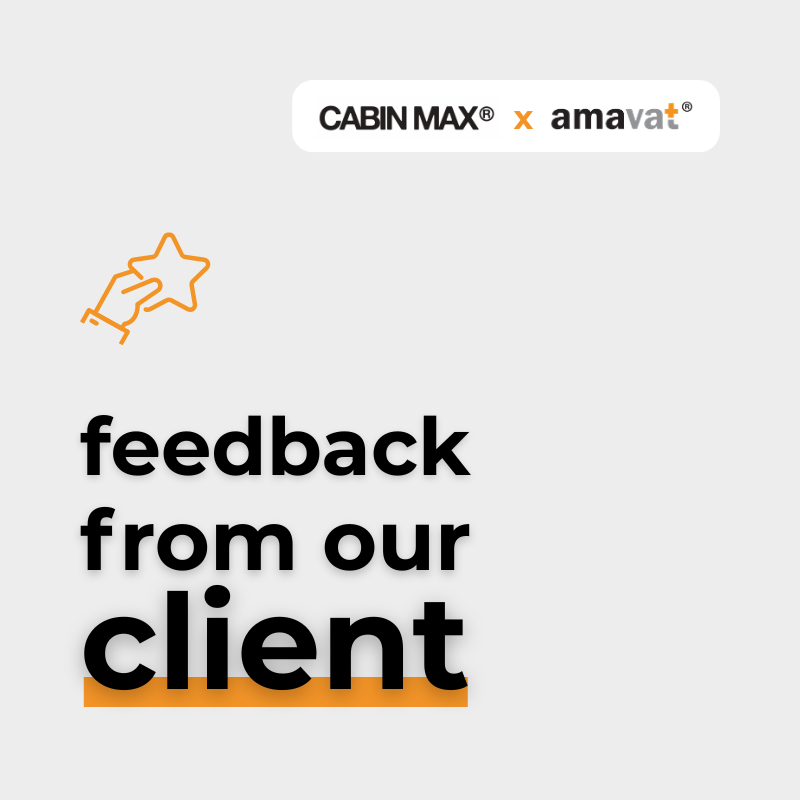CABIN MAX x amavat

Spis treści
The brand’s success story started with a simple but real need—Cabin Max’s founder, during one of his Ryanair trips, couldn’t find a backpack that actually fit the airline’s strict size rules. So… he made one himself. What began as a practical idea evolved into a global brand, backed by a dedicated team based in Wrexham, countless customer reviews, and a loyal community of travelers tagging their photos with #cabinmax.
But even the best-designed backpack won’t help if you trip over red tape. Like any company selling across Europe, Cabin Max has to navigate the challenges of VAT—and tax systems in countries like Poland can throw you a curveball, especially when something slips through the cracks.
That’s exactly what brought them to us. And that’s when our journey together began—this time, through the maze of regulations, authorizations, and overdue filings.

Starting point
VAT registration in Poland—what comes next?
Cabin Max registered for VAT in Poland back in 2020 as part of their strategy to support European sales. Poland served as a key logistics hub—products were stored there and shipped to customers across the EU.
For a long time, everything ran smoothly. The company was actively registered, and VAT compliance allowed for legal and seamless sales operations.
Then things changed
In the second half of 2024, issues started cropping up—mainly because VAT returns weren’t filed on time. As a result, the Polish tax office flagged the company as inactive and removed it from the VAT register.
From the perspective of a foreign business, this was a major disruption. Losing an active VAT number could affect not just accounting processes, but also relationships with partners and customers across the EU.
When they reached out to us…
By the time Cabin Max got in touch with us, things had already escalated. The company had no up-to-date information about its VAT status in Poland, and the VAT processes urgently needed a diagnosis—and a fix.
We got to work even before the first meeting. Our goal was clear: get the company fully operational again as quickly as possible and sort out all administrative backlogs.
First Contact with Amavat
Before we even had a chance to schedule an initial meeting with Cabin Max, we decided not to wait. We knew the situation called for immediate action—so we reached out to the relevant tax office in Poland straight away to check the current status of the company’s VAT registration.
This proactive approach allowed us to confirm that the VAT number had, in fact, been deactivated, and the company was no longer officially listed as an active VAT taxpayer. Having this clarity meant we could prepare thoroughly for our first meeting with the client and avoid wasting time on guesswork.
During that first conversation, our focus was on making things as clear and straightforward as possible— explaining what had happened, and what needed to be done to reverse the situation. We walked the client through the entire process, step by step:
- Collecting and preparing transactional data
- Reinstating the power of attorney
- Submitting overdue VAT returns
- Filing the request to reactivate the VAT number
Transparency and a stress-free approach were key—especially since the client operates internationally and isn’t familiar with the ins and outs of Polish administrative procedures.
Clear Pricing, Honest Approach
We understood this was not a standard case, so we prepared a custom quote for what we called a “tax clean-up operation.” Our goal wasn’t to inflate the costs, but to resolve the situation as efficiently as possible and get the business back on track.
It was our way of signaling to the client that we play fair—that we see this as a long-term partnership, and we’re here to deliver real support.
Step-by-Step Remedial Action
The first step was gathering sales data necessary to file the missing VAT returns. While it may sound simple, the reality was more complex—some files had errors, and parts of the data didn’t meet the specific standards of the Polish tax authorities.
This is where Tomek from our team stepped in. He took charge of the technical side of the process, combing through the data line by line, fixing inconsistencies, and reformatting it to ensure everything was ready for submission.

Quick Response to Rejected Authorizations
Then came an unexpected hurdle—the powers of attorney allowing us to act on the client’s behalf were rejected by the tax office. Why? The previous authorization submission had been filed incorrectly.
For many companies, this kind of issue could mean weeks of delay—but we acted fast. We quickly prepared corrected documentation, resubmitted the authorization, and followed up to ensure it was approved.
The result? Within just a few days, we had official authorization in place, allowing us to move forward without delay.
Submitting the Overdue VAT Returns
With the data cleaned up and our representation confirmed, we could finally tackle the core task—filing the overdue VAT returns. The process went smoothly and without complications—everything was prepared in line with current regulations, and the documents were submitted on time.
Thanks to our careful preparation and close coordination with the tax office, we avoided any follow-up questions or corrections.
Filing for VAT Number Reinstatement
The final step was submitting the application to reinstate the company’s VAT number. We compiled all the necessary documentation and submitted it along with the VAT returns—ensuring the tax authorities had a complete picture of the client’s situation to make a well-informed decision.
Our goal was to present the case not as a “problem,” but as a responsibly handled matter—and we succeeded. Before long, the VAT number was officially reinstated, and the company was once again able to operate legally on the Polish market.
The Outcome of Our Collaboration
VAT Number Reinstated—Faster Than Expected
Thanks to efficient coordination, a solid understanding of local regulations, and strong communication with the tax office, the client’s VAT number was reinstated without unnecessary delays. It was a pivotal moment—because while it may have been “just” a formal return to the register, for Cabin Max, it reopened the door to full operations in Poland and uninterrupted sales across the EU.
For a global e-commerce brand, time is money—every week of downtime means potential revenue loss. That’s why response time and bureaucratic efficiency had a very real impact on the company’s operational security.
Restoring Trust in the VAT Process
One of the less tangible but equally important outcomes was something you can’t measure in euros or percentages: the restored sense of control and confidence that their tax matters were in good hands.
Cabin Max, headquartered in the UK, operates across multiple markets. They don’t have in-country accounting teams everywhere—so they need partners they can truly rely on. Our job wasn’t just to fix a problem; it was to rebuild trust in the system and make sure this kind of situation wouldn’t happen again.
A New Chapter—Ready for Continued Partnership
Most importantly, this partnership didn’t end with putting out the fire. Once the Polish VAT issue was resolved, Cabin Max began actively considering expanding their cooperation with Amavat to other countries where they sell.
Their positive experience, seamless support, and our transparent online platform convinced them that automated VAT compliance doesn’t mean sacrificing human connection. On the contrary—the blend of smart tech and a personal touch became a value they now want to build on.
Client Feedback
For companies like Cabin Max, selling to customers across Europe, efficient VAT handling is absolutely essential. But in reality—due to language barriers, legal differences, and local processes—VAT can quickly become a source of stress and uncertainty.
That’s why one of Cabin Max’s top expectations from a VAT partner was clear communication, practical support, and access to someone who’s actually in charge of the case. Someone who not only answers questions, but also stays ahead of potential issues.
So how did it work in practice?
Here’s what the client had to say about working with us:

It’s worth highlighting that having a dedicated contact person—in this case, Elżbieta—was a major asset for Cabin Max. She served as the bridge between the UK team and the Polish tax authorities, clarifying complexities, streamlining communication, and keeping everything on track.
Expanding the Relationship
Their satisfaction with how the situation was handled led the client to seriously consider entrusting us with VAT compliance across other EU markets as well.

For us, that’s more than just praise—it’s proof that combining automation with personalized service really works. In e-commerce, it’s not enough to be “just a VAT system”—you need to be a partner who truly understands the client’s business.
Takeaways and Competitive Advantages
This project clearly demonstrated that effective VAT support in e-commerce can’t be one-size-fits-all. Clients don’t need another generic platform with a form generator—they need a solution that blends technology, expertise, and human insight.
That was our key to success:
➜ Proactivity—we acted before the first question was even asked.
➜ Expert knowledge—we knew how to talk to the tax office and what documents were needed to avoid delays.
➜ Consistent communication—the client had a dedicated manager keeping them informed and involved.
➜ Automation that really works—our system wasn’t just convenient, it was designed for the realities of cross-border sales.
➜ A real person on the other end—not a chatbot taking tickets.
We also learned something else—VAT isn’t just about numbers. It’s about trust. It’s about staying compliant across multiple jurisdictions. It’s about operational security and brand reputation—especially when a company operates globally and relies on complex logistics.
Working with Cabin Max proved that even in a crisis, you can do more than just restore order—you can build a partnership based on trust and shared goals.
Smooth VAT operations are the backbone of successful cross-border sales. If your e-commerce business is looking for a partner who combines automation with real, human support—let’s talk.
Take care of your taxes before they take care of you. Get in touch with us and see what we can do for your business.

